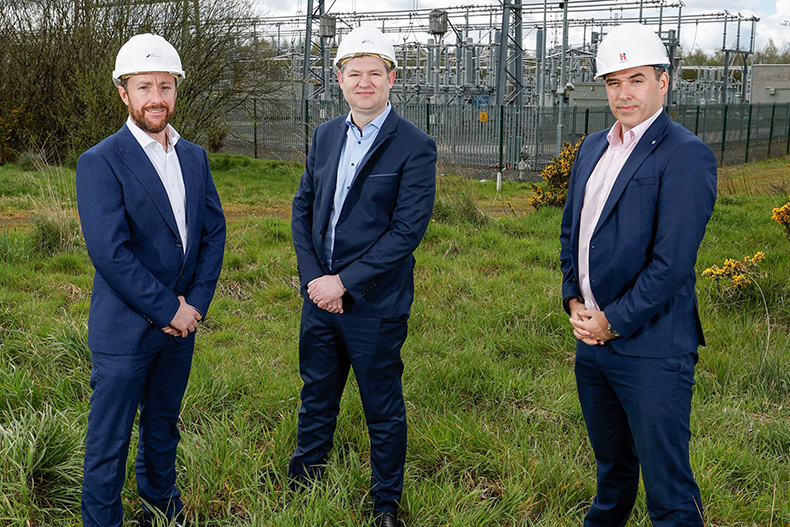
Above: Daniel Barnes, Head of Solar and Battery Development, SSE Renewables with Chris Morrow, NI Chamber of Commerce, and Damien O’Callaghan, Managing Director, Heron Group.
Construction of 100MW / 200MWh battery system could be operational by end 2026
SSE Renewables has acquired a fully consented 100MW / 200MWh battery storage project near Dungannon, County Tyrone, Northern Ireland, from Heron Energy, part of the leading construction, property development and manufacturing entity, Heron Group.
SSE Renewables is one of the leading developers and operators of green energy generation in Northern Ireland.
At an installed capacity of 100MW / 200MWh, the Derrymeen battery energy storage system (BESS) would be the largest installed battery storage facility in Northern Ireland if delivered. Subject to a final investment decision by SSE Renewables, the shovel-ready project will be constructed on a greenfield site located outside Coalisland, around five miles from Dungannon.
The Derrymeen BESS would be capable of storing up to 200MWh of energy for flexible dispatch when needed for use by Northern Ireland homes and businesses at times of peak demand. When called upon, the system would be capable of providing back-up energy to the equivalent of over 135,000 homes in Northern Ireland for up to two hours at a time*.
The Derrymeen project is SSE Renewables’ first battery storage development in Northern Ireland. It would deliver significant economic and job creation benefits to County Tyrone and Northern Ireland during construction. If approved for final delivery, construction could commence on the project early next year and be operational by the end of 2026, providing a welcome boost to the local economy.
Mark Ennis, Chairperson of SSE plc in Ireland, said at the announcement: “With the return of the Stormont Executive, there is no better time for SSE to be making its first investment in a battery storage project in Northern Ireland. The delivery of the Derrymeen battery project would make an important contribution to SSE plc’s overall Net Zero Acceleration Programme, our fully funded five-year investment plan which will see SSE Renewables investing over £7bn to 2027, or almost £4m a day on average, to deliver the low carbon energy infrastructure that will support the UK and Ireland’s transition to net zero, including new battery storage technology.”
Battery storage technology plays a key role in unlocking the path to net zero because of its ability to hold and release energy when most needed. Batteries work by storing energy when output from natural sources such as wind is high, and then releasing it as required at times of peak energy demand. They are fast responding and will play an increasingly important role in Northern Ireland’s energy mix as more carbon-based generation in the region is phased out and further replaced by more renewables.
Daniel Barnes, Head of Solar and Battery Development (Ireland), SSE Renewables, said: “This acquisition further demonstrates SSE Renewables’ aim to lead the way in the transition to net zero, as we build out vital battery energy storage systems that will be capable of making the grid more resilient, while maximising the opportunity to harness surplus renewable energy generated from onshore wind and solar generation in Northern Ireland for use at times when the wind doesn’t blow and the sun doesn’t shine. We look forward to working with policy and regulatory authorities in Northern Ireland to ensure much-needed energy storage solutions can be delivered in the region and operate effectively within the framework of the All-Island Single Energy Market.”
The project secured planning consent from Mid Ulster District Council in 2023. The energy storage site will connect to Northern Ireland’s electricity grid via an underground cable to the existing nearby Tamnamore substation.
Damien O’Callaghan, Managing Director, Heron Group, said: “At the heart of our vision and values lies a commitment to sustainability and responsible business practices. Embracing renewable technology through Heron Energy underpins this dedication, and is aligned with our overarching Environmental, Social, and Governance (ESG) Vision 2030 strategy. This is the first of a large number of developments currently underway and by harnessing the power of renewables, we will not only reduce our carbon footprint but also contribute to a brighter, cleaner future for generations to come. These projects are only viable due to the forward thinking by SONI and local councils such as Mid Ulster District Council in allowing investment in grid infrastructure to safeguard power users in the area.”
Suzanne Wylie, Chief Executive, Northern Ireland Chamber of Commerce and Industry (NI Chamber) added: “This deal marks a significant milestone between two leading businesses with a very strong footprint across Northern Ireland. The investment is timely, as NI businesses continue to reiterate the need to deliver a strong energy infrastructure which supports their sustainability targets. When complete, the Derrymeen project will play a significant role in delivering the region’s green growth potential and be an enabler of the low carbon economy of the future.”
In addition to Derrymeen, SSE Renewables is currently developing an 80MW battery project at Tawnaghamore, County Mayo, and a 100MW battery at Tarbert, County Kerry. In Great Britain, the company has brought its first battery asset into operations at Salisbury. It is also constructing a 150MW battery project in Ferrybridge, West Yorkshire (due to complete in the first half of next year), a second 150MW project at Fiddlers Ferry, and a 320MW battery project in Monk Fryston, North Yorkshire.
Advisers on the transaction were Grant Thornton (Corporate Finance) and Tughans (Legal) for Heron Energy, and A&L Goodbody Northern Ireland for SSE Renewables (Legal).
* 136,875 homes supplied for 2 hours, based on an 100MW (200MWh) battery against assumed daytime (08:00-20:00) hourly use of 0.73kWh at a typical home (Typical Domestic Consumption Values, Medium Electricity Profile Class 1, 3,200kWh per household, Utility Regulator).

